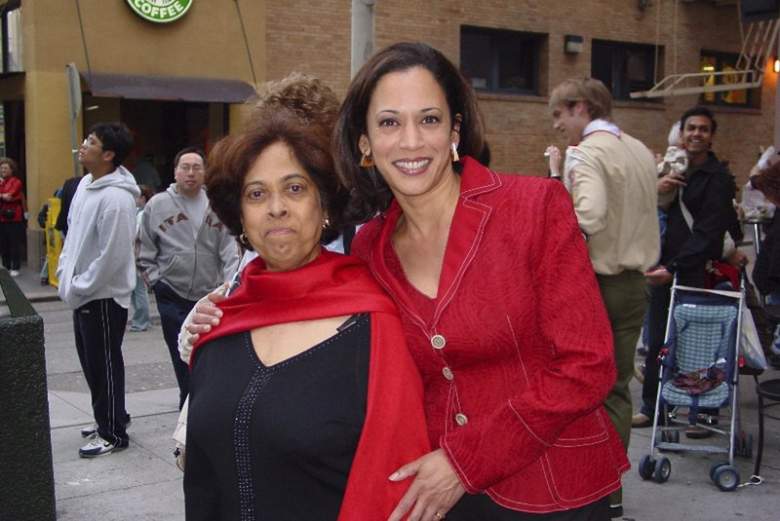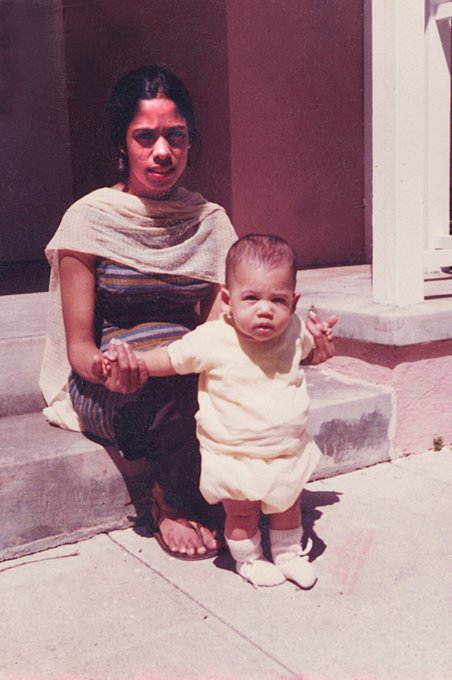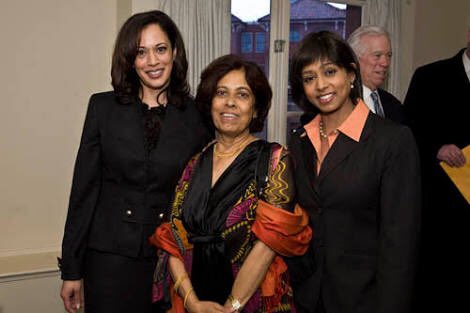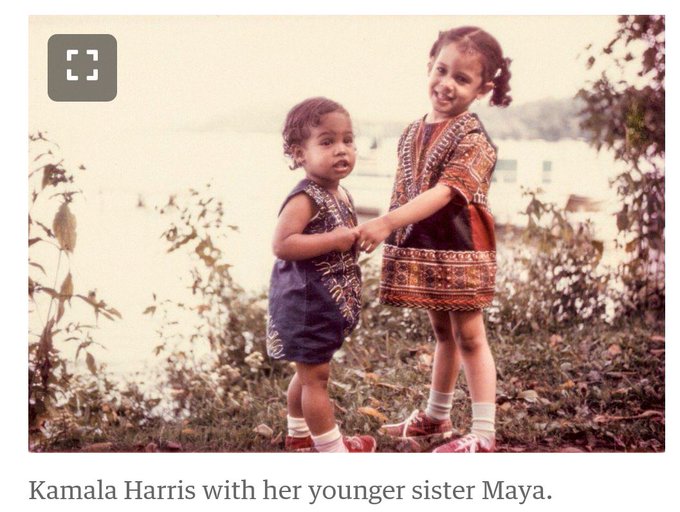
Harris Campaign Kamala Harris with her late mother, Shyamala Gopalan.
Dr. Shyamala Gopalan is the late mother of Kamala Harris and was a world-renowned cancer researcher and civil rights activist from Chennai, India. Gopalan died in 2009 at age 70.
Gopalan was born to a high-ranking official in the Indian Government, according to the Los Angeles Times.
Harris is a junior U.S. Senator from California who was elected to office in 2017. She is also an attorney. Harris announced her bid for President on Martin Luther King Jr. Day, but eventually dropped out of the race. Biden named Harris as his running mate on August 11, 2020. She will be sworn in as vice president January 20, 2021.
Gopalan was born in Chennai, India, on April 7, 1938. She graduated from the University of Delhi at age 19 and became a doctor of philosophy in nutrition and endocrinology from the University of California, Berkeley at age 25. While she was attending Berkeley, she became involved in the Civil Rights Movement and met her husband, Donald Harris.
Gopalan and Donald Harris had two children, Kamala and Maya. The couple separated when Kamala Harris was seven and later divorced.
Gopalan stayed at the University of California Berkeley for her career, working in the Cancer Research Lab in Berkeley’s Department of Zoology. She later worked as a breast cancer researcher for the University of Illinois and the University of Wisconsin. She later served on the President’s Special Commission on Breast cancer.
Kamala Harris wrote about her mother’s battle with colon cancer in a New York Times opinion piece, Everyone Gets Sick. And We Deserve Better.
“There is no title or honor on earth I’ll treasure more than to say I am Shyamala Gopalan Harris’s daughter,” Kamala Harris wrote.
Here’s what you need to know about Shyamala Gopalan, Kamala Harris’ mother:
1. Shyamala ‘Prepared Kamala Harris for Politics, Kamala Said
Kamala Harris came from a long of strong women, India Abroad reported. Shyamala Harris gave her daughter a sense of “audacious idealism, purpose and ambition. Shyamala’s father was involved in India’s movement against colonial rule. Shyamala’s grandmother passed on her “crusading civic spirit” to both her daughter and granddaughter, the article said.
“There is no title or honor on earth I’ll treasure more than to say I am Shyamala Gopalan Harris’s daughter. That is the truth I hold dearest of all,” Harris wrote in her memoir.
Harris wrote her mom taught her “It’s too hard!” was never an acceptable excuse, and “that being a good person meant standing for something larger than yourself; that success is measured in part by what you help others achieve and accomplish.”
2.She Moved to the U.S. From India & Earned Her Ph.D. at 25
Shyamala Gopalan earned her undergraduate degree at the University of Delhi at age 19 and moved to the United States to earn a Ph. D. in nutrition and endocrinology at age 25 from the University of California at Berkeley, her obituary said.
Her doctorate led her on her career path into cancer research.
“Despite her 5-ft stature, hers was a commanding presence characterized by a sharp wit, keen sense of humor and endless depth of knowledge,” her obituary said.
3. She Worked In Cancer Research
Shyamala Gopalan earned multiple honors over decades of cancer research.
Her obituary discussed her career, awards and research, which she coupled with social advocacy.
“Shyamala spent her early career conducting research at Berkeley’s Dept of Zoology and Cancer Research Lab. She returned to the U.C. campus for the last decade of her work at the Lawrence Berkeley Lab. Her talent as a breast cancer researcher took her to universities around the world, from the Univ of Illinois and Univ of Wisconsin, to France, Italy, and a 16-year tenure at the Lady Davis Inst for Med Research at the Jewish General Hosp and the Dept of Med at McGill Univ. in Montreal. She made substantial contributions to the field of hormones and breast cancer, publishing her research in countless journals and receiving numerous honors. A frequent Nat’l Inst of Health peer reviewer and Federal Advisory Committee site visit team member, Shyamala’s distinction led to her service on the President’s Special Comm’n on Breast Cancer. One of her greatest contributions was her seminal work in isolating and characterizing the progesterone receptor gene in a mouse-a momentous finding that transformed our understanding of the hormone-responsiveness of breast tissue. Her discovery sparked a plethora of advancements regarding the role of progesterone and its cellular receptor in breast biology and cancer. Perhaps Shyamala’s most enduring legacy in science stemmed from her efforts as a teacher. Dozens of students populated her lab through the years. Often of color and the first in their families to pursue careers in science, these students eagerly sought Shyamala’s mentorship, which often stretched beyond the lab to encompass lessons in life. Whether helping a student negotiate the UC bureaucracy, find an affordable apartment, or enjoy a home cooked meal, Shyamala was there. She took tremendous pride in their love of learning and later successes, as many grew to take on leadership positions in medicine and science. And then there were the quiet acts of kindness she performed without fanfare or notoriety, such as counseling and comforting African-American women battling breast cancer. Her passion for science was augmented by a fervent commitment to social justice.”
Shyamala Gopolan was diagnosed with colon cancer and died in 2009. Kamala Harris wrote a memoir to her mother in a New York Times opinion piece, Everybody Gets Sick, And We Deserve Better. Harris wrote that her mother called her and her sister, Maya, to go to lunch in 2008 and told them about the diagnosis.
“I know that many can relate to the emotions I felt in that moment. Even just reflecting back on it now fills me with dread. It was one of the worst days of my life,” Harris wrote.
“The hard truth is that every one of us will go through an experience like that sooner or later, whether it is coming to terms with a loved one’s terminal illness or experiencing our own. My mother was a breast cancer researcher. She understood, from a career of looking at cancer cells under a microscope, that no matter who we are or where we are from, our bodies are essentially the same. They work the same way — and they break down the same way, too.
“She got sick before the Affordable Care Act became law, back when it was still legal for health insurance companies to deny coverage for pre-existing conditions. I remember thanking God she had Medicare.”
Harris said she was grateful her mother had Medicare. She used the story to share her support of Medicare for All.
4. She Joined The Civil Rights Movement At Berkeley
Shyamala Gopalan moved to the United States to attend the University of California at Berkeley, where she earned her doctorate.
She met Donald Harris, her future husband, after joining The Civil Rights Movement.
The couple had two children, Kamala Harris and Maya Harris. Shyamala and Gopalan separated when Kamala was 7.
Her obituary said she instilled the values of The Civil Rights Movement into both of her daughters.
“While a student at Berkeley in the ’60s, she became fully engaged in the Civil Rights Movement, leading to a lifelong fight against injustice, racial discrimination and intolerance,” her obituary said. “She instilled these values in her daughters, who in turn have dedicated their lives to the pursuit of justice and equality – one as the first female elected District Attorney of SF and the other as vice president of Peace and Social Justice at the Ford Foundation in NY.”
5. She Gave Her Daughters Hindu Names
Shyamala Harris gave her daughters, Kamala and Maya, names derived from Indian mythology, according to the Los Angeles Times.
Part of her reasoning was to preserve her Indian culture. Another reason was to give her daughters names she believed would encourage them to be strong women, the newspaper reported.
“A culture that worships goddesses produces strong women,” she told the Los Angeles Times.
READ NEXT: Jeff Kurtzman: Hawaiian Airline Flight Attendant Dies of COVID-19 Coronavirus





